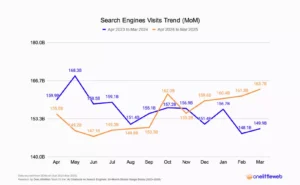Search isn’t the only way people find answers online anymore. Here’s how chatbots are reshaping how we navigate the web.

It turns out that it’s not just big search engines and little itty-bitty websites that have to worry about the unintended consequence of chatbots. Even some big sites that have been go-to locations for decades are feeling the pressure.
A case in point: WebMD appears to be, if not down for the count, losing the current round. Personally, I can understand why, as it hasn’t made a showing on my computer screen for well over a year.
That’s a big change. Once was a time that I would bring the site up on my laptop several times a week — whenever I thought I’d caught some disease I saw on a TV doctor drama, or when I wanted to see if there was some kind of miracle food that would be as effective as some expensive, side-effect laden pharmaceutical I was supposed to be taking. These days I just ask AI, in my case Perplexity, which always makes up something to ease me into believing everything’s going to be just fine.
No wonder RFK Jr. thinks it’s okay to dismantle the the medical system. We all have chatbots to help us keep the docs away. I’m kidding, BTW.
Anyway, thanks to the unintended consequence of generativeAI, traffic to WebMD is way down — from 122 million monthly visitors in 2024 to 69.5 million in 2025, a drop of 43.1%. The figures come from Loopex Digital, an Armenian SEO company that’s conducted a study on the effects caused by AI’s entrance into search space.
As an SEO company, Loopex naturally has skin in the game, and is likely seeking ways to help traffic-dependent websites continue to remain a destination in an age when traditional search ala Google is no longer the dependable source of website traffic it once was. Indeed, that point is borne out by the survey, which reports that Google searches for the term “WebMD” were down 15.2% this year over last.
“The rise of AI chat tools is fundamentally changing how people access information online, shifting traffic and engagement away from traditional websites,” an unnamed Loopex spokesperson said in a statement that accompanied the study. “The declines in visits and searches across major sites show how quickly user behavior is evolving as people turn to AI for instant answers. For businesses and content providers, understanding these changes is essential to adapting digital strategies, maintaining visibility, and meeting users where they are.”
The Unintended Consequences of AI Search
In the computer age, unintended consequences are the rule rather than the exception.
For example, I don’t think any of us who were around back in the days of Netscape and dial-up had any idea of the number of seemingly solid, traditional industries that would be laid to waste as the world moved online.
Take newspapers, for instance. I never in my life imagined that daily papers delivered by kids on bikes would cease to be an important part of American life. That remained true even as I began to notice as I started spending more and more time online that I was no longer buying newspapers because I was able to access all the news I wanted through my computer.
I also noticed at about the same time that I wasn’t going to breakfast joints every morning as I once did, because I felt awkward sitting there all alone, staring at walls since I no longer felt compelled to purchase a newspaper to occupy my mind as I waited for bacon and eggs. Which reminds me: have you noticed that starting about 2010 there have been fewer and fewer good breakfast places?
It’s the same with TV and radio. During the late 1990s, when the internet was the new thing that everyone was just discovering, most television and radio outlets couldn’t be bothered to take more than a cursory “me too” approach to the web. By the middle of the 2010s, however, the Netflix handwriting was on the wall, and TV networks that had previously gone out of their way to keep their programming far away from the internet were opening their own streaming channels. By then, radio stations were all but begging listeners to download their apps — iHeartRadio, anyone? — because phones connected to Spotify and Bluetooth speakers had largely replaced radios and stereos as ways to listen to music or anything else except NPR.
And speaking of phones, don’t get me started on Steve Jobs’ introduction of the iPhone, which had the unintended consequence of shifting the entire focus of consumer computing from PCs and laptops to handheld devices with tiny screens.
Dropping Web Traffic
The mechanics of search has changed completely in this age of AI-based search, and it’s not just WebMD that’s feeling the crunch. Topping Loopex Digital’s list of websites losing traffic to AI search is Business Insider, which has seen a 48.5% drop in traffic — from 13.4 million monthly visitors last year to 6.9 million in 2025 — as more people turn to AI to get easier-to-digest condensed versions of articles and market updates.
Likewise, sites like Dictionary are also losing traffic to AI, enough to put it in third place on the study’s list. The word lookup site’s traffic this year dropped 37.3%, from 34.1 million to 21.3 million. Again, in hindsight it seems obvious that this would happen. Not only does AI make it super easy to find the correct spelling for words that elude spellcheck, it’s there to explain the word to you until you grok it, instead of offering a truncated dictionary definition that might be hard to understand.
That being said, all of this can easily be dismissed with a shrug. The thing to remember is that this is only a warning bell — not a death notice. Yes, it’s going to hurt sites that aren’t paying attention to their visitor’s wants and needs, as well as sites that offer automated “take it or leave it” services.
Christine Hall has been a journalist since 1971. In 2001, she began writing a weekly consumer computer column and started covering Linux and FOSS in 2002 after making the switch to GNU/Linux. Follow her on Twitter: @BrideOfLinux





